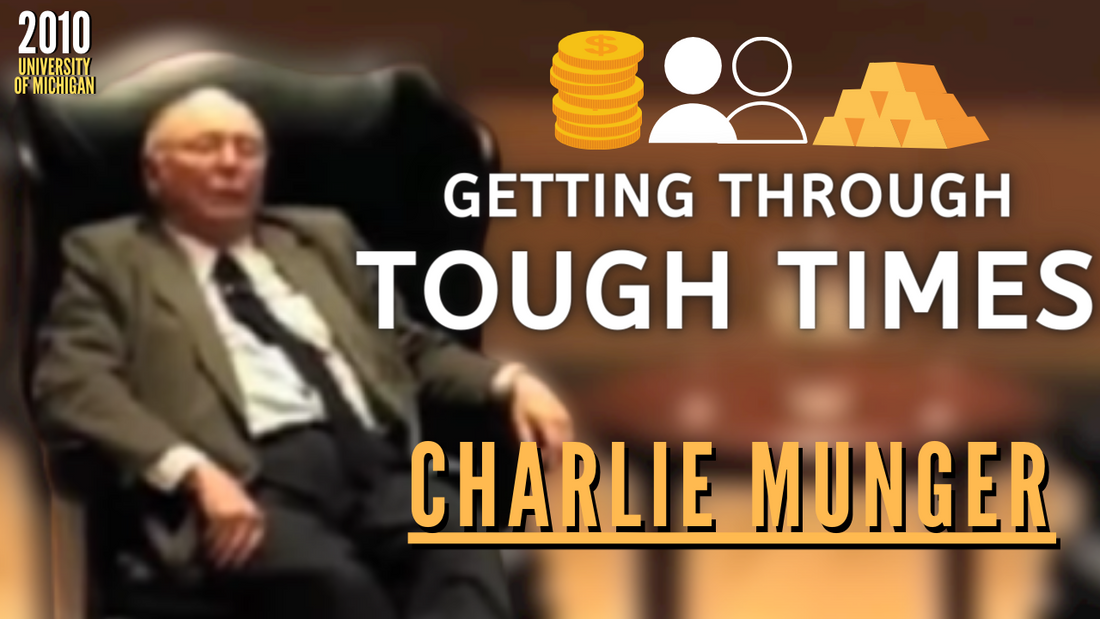
Charlie Munger: How to Get Through Tough Times. | University of Michigan 2010【C:C.M Ep.189】
[Transcript]
BECKY QUICK: But we thought we'd just start off and talk a little bit about the economy. Obviously, it's a very difficult economy to try and gauge. But Charlie you've got a very good perspective as the vice chairman of Berkshire with so many different companies, what would you say that your best guess is right now when it comes to the economy?
CHARLIE MUNGER: Well, let me start with the qualification.
Warren and I have not made our way in life by making successful macroeconomic predictions and betting on our conclusions. Our system is to swim as competently as we can and sometimes the tide will be with us and sometimes it will be against us.
But by and large, we don't much bother with trying to predict the tides because we planned to play the game for a long time. I recommend all of you exactly the same attitude. It's kind of a snare and a delusion to outguess macroeconomic cycles, very few people do it successfully and some of them do it by accident.
When the game is that tough, why not adopt the other system of swimming as competently as you can and figuring that over a long life, you'll have your share of good tides and bad tides.
And so with that qualification, of course, everybody has some ideas on the economy, but I want you to understand that these ideas do not have the credibility of anybody who successfully made macroeconomic predictions.
In other words, they may not be worth very much but I will be surprised if employment bounces back with the wonderful speed that it did after previous economic disappointments of the one we've been through.
I've just seen business after business after business, which is rationalized so that it can do creditably in terms of protecting its balance sheet and its earning power while utilizing fewer people. So this is a bad market for easy employment compared to the conditions which have existed most of the time in recent decades. And some of you are going out into a bad market.
My attitude toward that it's very simple, I think you should all just say "So what?" There are good tides and there are bad tides, I have a long way to go. And we know from the example of other people that if you constantly stand well by your own generation and cope with competency and grace with whatever life deals you and just keep doing it, your share of the honors and emoluments of the civilization in due time are very likely to come.
If you deserve the emoluments and of course, that's the other advice, the best way to get what you want in life is to deserve what you want. How could it be otherwise? It's not crazy enough so that the world is looking for a lot of undeserving people to reward. (Laughter)
BECKY QUICK: Well, let me ask you –
CHARLIE MUNGER: And so you just – you keep plugging. So I wouldn't be discouraged.
I told a group this morning about example of what I call a real bad employment market. My uncle Fred graduated from the Harvard School of Architecture with great distinction. And in the 20s, he had a very successful architectural practice in Omaha where he did churches and little buildings and houses and so forth. And he made eight or ten thousand dollars a year which was an enormous amount of money to make from credibly performing the architectural profession in the 1920s.
When the 30s came, the architectural permits – building permits in Omaha would sometimes go down to thirty thousand dollars per month for the whole city of Omaha. And some of those were furnace repairs. There was exactly zero work for architects including my distinguished architect uncle Fred. He moved to California.
And in California, he took drafting work at low rates for few architects that still had some work. And when it got worse than that, he went to the County of Los Angeles. In the agony of the county, they classified him as a laundryman to save money, but had him do drafting work which after all was exercising his skill.
He didn't think it was beneath him, he coped his best he could, he never complained to anybody. And his pay after deductions all through 31, 32, 33, 34, $108 per month. Now, that wasn't as bad as it seems because he rented a whole house in Glendale for $25 a month.
When they created the FHA in 1936, he could take a civil service exam which he was first. So for the rest of his life, he was the chief architect for the FHA in Los Angeles, a responsible and interesting, and civilization benefiting line of work and he had a long and happy career doing that.
He never got discouraged, he never thought what he had to do was something he should whale about. I never heard him complain about anything. Woe was me.
Generally speaking, there are two things I found in my long life when you never do;
One is never feel sorry for yourself, if your child is dying of cancer don't feel sorry for yourself. Never ever feel sorry for yourself.
The other thing, you never want to have is envy. That's the only one of the deadly sins, you're never going to have any fun at all. (Laughter) Pick one of the others. (Laughter)
And so, but if you go through life just everlastingly plugging away at these bad times, you know, Kipling has gone totally out of vogue because it's not politically correct to write lines like, woman is only a woman, but a good cigar is a smoke.
It's and, of course, so nobody is familiar with Kipling, but Kipling's If is still great poetry. If you can keep your mind [inaudible] all about you are losing theirs, just think of what good advice that would have been on Wall Street in a lot of other places recently. And treat the little fluctuations in faith, he said treat those two impostors, success and failure, just the same. And in the end, he says, well, if whatever else happens, you'll be a man, my son. Good message, good message.
I mean, why not take these opportunities, the hardships and so forth to make a man of yourself or a person of yourself to use the modern lingo. And so I know how you should cope with whatever the difficulties are at the present era, just keep your head down and do your best and do that.
Some of the people who have the best careers in my age, cohort of the age court just before mine, but the ones who had the worst clobbering in the 30s because they were there when the great boom came. If you just kept plugging why the favorable tide came in due course.
Well, so much for current passing troubles economically. I do think that the job market is likely to be fairly lousy for a long time. And I do think that the worst or troubles in certain markets are not over.
BERKY QUICK: Which markets do you think?
CHARLIE MUNGER: Well, I think the universities that thought they were making successful investment in timber because they were all buying the same groves are still in from some disappointment. And I think that the worst in a lot of real estate ventures is still ahead of us.
And so I think there's plenty of pain out there still to come. That doesn't mean we won't pass through, it just means that there's plenty of unpleasantness still ahead.
(Source: https://youtu.be/Pph3Bg8Pihg)
[YAPSS Takeaway]
